Oceans may be rare in the inner Solar System—Mars and Mercury are too small for oceans while Mercury and Venus are too hot—but if we consider that water is composed of hydrogen (the most common element in the universe) and oxygen (the third most common element), it seems likely that water would be pretty common too. Indeed, if we look at the worlds out beyond the Solar System’s frost line, we note that there are likely to be oceans within Europa, Enceladus, Ganymede, Ceres, Pluto, and other small worlds.1
As for exoplanets (which we have been discovering at a surprising rate, of late) … well, some of them must have oceans, or be covered with oceans, as well. SF authors, even before the exoplanet boom, have long been imagining water worlds. Here are a few books about ocean planets.
The Blue World by Jack Vance (1966)
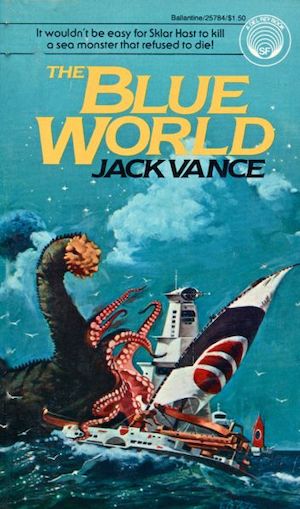
Generations ago, human refugees found a world with no land. There were only floating plants—Floats—on which to make their homes. Which they did. They then found that their settlements had few defenses against native predators. The humans reluctantly made a pact with a giant intelligent predator named King Kragen, providing Kragen with food in exchange for protection.2
The human Sklar Hast protests this arrangement. He doesn’t get much of a hearing; the powers-that-be are satisfied with things as they are. If Sklar is so unhappy, let him go find a new life, as an exile in an ocean wilderness where humans are nothing but food.
***
A Door Into Ocean by Joan Slonczewski (1986)
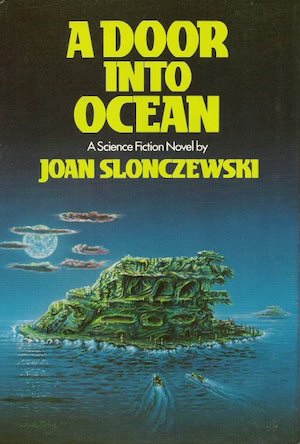
The Sharers of ocean moon Shora are parthenogenic pacifists and highly advanced in biological sciences. They have used their expertise to adapt themselves to their moon. Into this idyll come the imperialist Valedon, who regard the aquatic Sharers as less than human. Valedon has plans to monetize Shora and its resources. The conquerors expect no resistance from the pacifist Sharers. What can they do, if they’ve renounced violence?
***
Noise by Hal Clement (2003)
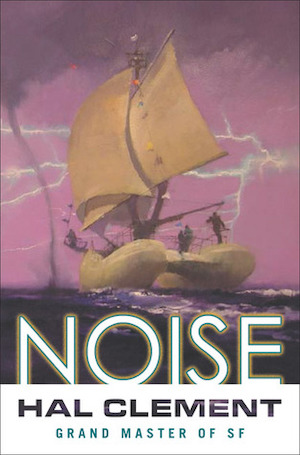
The water world Kainui is inhospitable: there’s no dry land, huge thunderstorms are frequent, the atmosphere is anoxic, and the lifeless acidic oceans are almost three thousand kilometers deep. Perhaps it could be terraformed…but who would bother? Turns out that some humans are willing to live there even without terraforming.
Several centuries ago, Polynesians settled the planet armed with pseudolife, a form of advanced nanotechnology.3 They have thriven and multiplied. New languages have evolved.
Terran linguist Mike Hoani arrives to study these languages. He’s received with a notable lack of interest. The locals aren’t hostile, but they aren’t putting themselves out to be helpful. There are no free lunches on Kainui; if Mike wants to study Kainui linguistics, he will have to find a paying position where he can learn languages as he works. But first he has to manage a crucial skill: surviving on an unfamiliar world.
***
Aria by Kozue Amano (2001–2008)
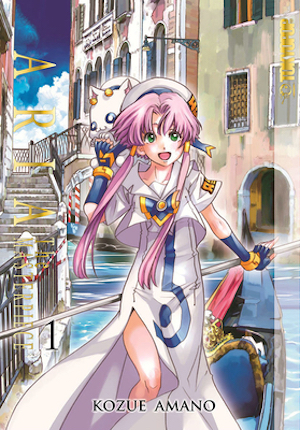
By the 24th century, Mars has been transformed from a nearly airless desert world to a hospitable ocean world. It has been renamed “Aqua.” The largest city on Aqua is Neo-Venezia, whose architecture and narrow canals deliberately recall those of Earth’s Venice.
Akari Mizunashi dreams of becoming an Undine, one of the young women who pole gondolas through Neo-Venezia’s canals. This requires hard work and persistence. As readers follow her progress, they learn more about Neo-Venezia and the world around it. Aria is notable for appealing characters and lush artwork.
***
Arkfall by Carolyn Ives Gilman (2008)
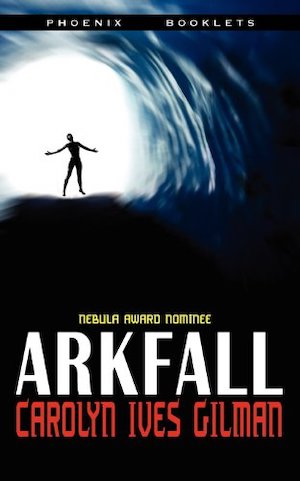
The frigid moon Ben lacks native life…but it now has humans. The human settlers have dedicated themselves to the Great Work, a vast project which will draw on the geothermal power of the Great Cleft to turn one small corner of Ben into a living sea. This is the work of lifetimes, one that demands dedication, cooperation, and self-sacrifice from the local humans.
The Great Cleft is a dangerous place in which to live and work. An unanticipated eruption sends the free-floating habitat of Divernon out of familiar, protected waters and into the World Ocean. The tiny habitat is self-contained and self-sufficient; it should be able to sustain the three humans trapped inside as long as they can stand each other. Note the word “should.” Ben has surprises in store for the inhabitants of Divernon.
***
No doubt tales of alien oceans are as common as the alien oceans will eventually prove to be in real life. Feel free to mention the ones I’ve overlooked in the comments below.
In the words of Wikipedia editor TexasAndroid, prolific book reviewer and perennial Darwin Award nominee James Davis Nicoll is of “questionable notability.” His work has appeared in Publishers Weekly and Romantic Times as well as on his own websites, James Nicoll Reviews and Young People Read Old SFF (where he is assisted by editor Karen Lofstrom and web person Adrienne L. Travis). He is a four-time finalist for the Best Fan Writer Hugo Award and is surprisingly flammable.
[1]Large ones as well: Uranus and Neptune are both composed largely of water, albeit water under intense pressure and temperature. One recent paper suggests that Neptune-like worlds that migrate into the warmer regions of their stellar systems could shed their hydrogen and helium atmospheres and end up vast water worlds of a more familiar sort. Of course, having cited this paper many times over the years, I cannot now find it.
[2]Unusually for this sort of story, while Kragen has no problem killing humans as a rhetorical flourish, the tribute given to the alien does not include tasty tasty humans.
[3]Clement was writing about pseudolife before Drexler wrote about nanotech. Perhaps Clement was inspired by Feynman’s “There’s Lots of Room at the Bottom” (https://en.wikipedia.org/wiki/There's_Plenty_of_Room_at_the_Bottom).










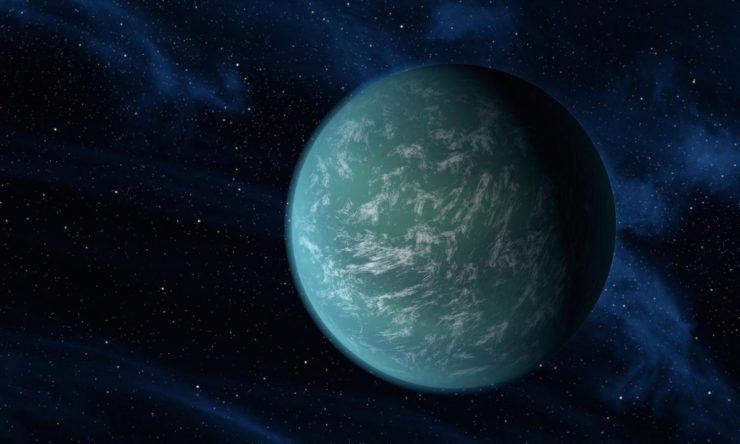
Solaris, by Stanislaw Lem is the fist book that comes to mind.
You led with the best! Great topic…
Amy Thomson’s Storyteller (centrally), and maybe The Color of Distance (mostly off-stage but there).
One of the Star Wars middle-grade ‘Junior Jedi Knights’ series, Nancy Richardson’s Lyric’s World, is a straight-up humanoid-mermaid story, except the children of the species live above surface and breathe oxygen (and have a heck of a time defending themselves from predators, which is where the idea of learning to use the Force comes in).
I am currently reading A Door into Ocean. Great book!
No room for Pandora, the creation of Frank Herbert & Bill Ransom?
Well, David Brin’s Startide Rising was the first thing that sprang to mind. More recently, Wen Spencer’s Endless Blue. Both feature starships trapped on water worlds, with the crews desiring to be elsewhere.
Walter Jon Williams’s Implied Spaces had a middle section of the book set not on a water world but a water pocket universe. I presume that counts. My cynical take is that section allowed Williams to write off a tropical vacation as a business expense. More power to him.
Since you said “books” rather than “science fiction books”, I’ll nominate Perelandra.
They should totally film a very expensive movie about a world covered in water…
I think I bounced off The Jesus Incident.
@6: Even in Startide Rising there was some land.
Hardly counts because it’s only on screen for about 15 minutes, but the movie Interstellar had the thoroughly inhospitable “Miller’s Planet”, with its skyscraper-high (literal) tidal waves.
Phooey. Now I want to listen to The Blue World, but as far as I can tell, it was never made into an audiobook. And now I’m earwormed with “Blue (Da Ba Dee)” by Eiffel 65, which my brother listened to a zillion times when we were kids.
Like most people, I sometimes can’t sleep for wondering about chemical cycles on pan-oceanic worlds. Can CO2 get locked away on a water world the way it did on Earth? Could a world like Blue Planet produce a breathable atmosphere? And how prone to runaway greenhouse would it be?
(For that matter, I wonder what Earth would looked like had the circumstances that led to the Carboniferous not happened)
Two from Alan Dean Foster: Cachalot, where all the cetaceans from Earth were resettled but, oops, turns out there’s a native intelligence that isn’t interested in sharing the planet. And Tran-Ky-Ky, which is (usually) frozen.
Oh, and Titan has (petrochemical) oceans. Could be life not-as-we-know-it there. All the bits are in place anyway.
James, here’s your article:
Habitable Evaporated Cores: Transforming Mini-Neptunes into Super-Earths in the Habitable Zones of M Dwarfs
Abstract
We show that photoevaporation of small gaseous exoplanets (“mini-Neptunes”) in the habitable zones of M dwarfs can remove several Earth masses of hydrogen and helium from these planets and transform them into potentially habitable worlds. We couple X-ray/extreme ultraviolet (XUV)–driven escape, thermal evolution, tidal evolution, and orbital migration to explore the types of systems that may harbor such “habitable evaporated cores” (HECs). We find that HECs are most likely to form from planets with ∼1 M⊕ solid cores with up to about 50% H/He by mass, though whether or not a given mini-Neptune forms a HEC is highly dependent on the early XUV evolution of the host star. As terrestrial planet formation around M dwarfs by accumulation of local material is likely to form planets that are small and dry, evaporation of small migrating mini-Neptunes could be one of the dominant formation mechanisms for volatile-rich Earths around these stars. Key Words: Astrobiology—Extrasolar terrestrial planets—Habitability—Planetary atmospheres—Tides. Astrobiology 15, 57–88.
The weirdest version of this idea is probably Bruce Sterling’s early novel Involution Ocean. The world of Nullaqua, as the name implies, has no water to speak of. What is has is a single very large habitable crater full of dust, which for handwavy reasons is functionally liquid, with an ecosystem that includes dustwhales. Humans live in a few cities along the rim, and hunt the whales from sailing ships. The novel is obviously inspired by Moby Dick, but from the POV of a drug addict in a style that seems very much tied to the late ’60s-early ’70s.
A Darkling Sea by James Cambias is a wonderful exploration of how intelligent life on an ocean planet might evolve.
I love A Door Into Ocean, but I am surprised (with Lmaclean @1) that Solaris was not on that list. That is the ocean planet to end all ocean planets.
I was going to mention the Tran-Ky-Ky books and Cachalot by ADF, but I see someone beat me there.
My own Castaway Planet books (with Eric Flint) are very much focused on an alien ocean world. More ocean than it first appears, in fact.
100% covered in water? I think that excludes Rocheworld by Robert Forward.
Ooo, one more: James Schmitz’ Nile Etland stories, with my favorite being The Demon Breed/The Tuvela.
I never got into Lem, so not only did I not mention his work here, I did not mention it in past essays and probably won’t mention it in future essays.
@21 Actually it doesn’t. The “Eau lobe” was covered in water, the “Roche lobe” had no water (except during Bloop events).
Nancy Lebovitz @@@@@ 7: Perelandra was a surprising book for me. I was not expecting the shift from SF with a theological edge (Out of the Silent Planet) to full-on theology.
I have read and love all three books, but the first is still my favorite.
Is _Noise_ set in the same universe as _The Nitrogen Fix_, or was Clement just repurposing the idea of pseudolife?
26: The second, I think. There are a number of pseudolife stories and The Nitrogen Fix seems to be a timeline where humans bungled implementation rather badly.
Does Flight of the Dragonfly count? I really liked the Flouwen.
Neptune’s Brood by Charles Stross mostly takes place on a deep water world settled by artificial intelligences/machine people. That and it’s a great story about economics. In space.
Didn’t one of Robert Silverberg’s Majipoor books have a section set in the hemisphere-spanning ocean on the other side of the planet?
Also China Mieville’s The Scar.
Solaris anyone?
Dan Simmons’ Hyperion Cantos has a few planets that qualify for this one. Most obviously Mare Infinitus, which as the name implies is a purely oceanic planet roughly akin to Kamino in Star Wars. Also probably meeting the criteria are Sol Draconi Septem, which is completely covered in kilometer thick ice and Maui Covenant, a mostly ocean world with semi-sentient motile islands that the “native” people live on.
Alison Sinclair’s Blueheart
And Bob Shaw’s Medusa’s Children sort of qualifies – it’s set in a giant waterball In Spaaaace (an enormous ocean reservoir set up by Ancient Aliens to keep Earth’s ocean levels consistent look just roll with it OK).
Jonathan Howard’s Katya’s World and the sequel Katya’s War are young adult books set on the waterworld of Russalka.
CO2 can get taken up by life here on Earth and transformed into organic matter, which can be buried in sediments at the bottom of the ocean. (Though most of that gets eaten and turned back into CO2, at least a little does stay buried.) It can also get turned into CaCO3 shells, which also get buried in the sediments. So a water world with life in the water and sedimentation could probably manage to store some CO2 out of the water and atmosphere. (And it could also sequester CO2 in the deep water for a while at least, depending on the circulation scheme. This is a leading hypothesis for why Earth’s atmospheric CO2 levels temporarily dropped during the most recent ice ages, when we have good atmospheric CO2 records from ice cores.)
The Face of the Waters by Robert Silverberg (1991) is set on an ocean planet full of interestingly dangerous wildlife, and involves sapient amphibious natives, human descendents-of-colonists, and a long, dangerous journey. But many readers find it shoddy work, judging by Goodreads reviews. I don’t remember exactly what-all put me off it despite the excellent setting, when I read it years ago, but I vaguely recall an unpalatable amount of misogyny and other bigotries.
Driving the Deep by Suzanne Palmer has a lovely ocean under Enceladus.
2nd A Darkling Sea by James Cambias and also mention again Cachalot by Alan Dean Foster.
Door into Ocean manages to put ecofeminism and anarchism together in a way that Le Guin didn’t quite work for me.
Charles Stross’s Neptune’s Children mostly takes place upon a water world.
Arthur C. Clarke’s The Songs of Distant Earth, anyone?
Although it is not novel-length, Roger Zelanzy’s “The Doors of His Face, the Lamps of His Mouth” deserves a mention.
Lloyd Biggle’s Monument is set on one small continent, in an otherwise global ocean.
@41 yeah, Venus-covered-with-oceans was A Thing before we got reports back from planetary probes. Henry Kuttner’s Fury and Asimov’s The Oceans of Venus are other examples, and someone’s already mentioned Perelandra.
Ice shell (Леденая Скорлупа) by Boris Stern (Борис Штерн). He is a Russian physicist and this is a book about the inhabitants of a subsurface ocean on one of the moons of Jupiter, told as a series of novellas; each chapter tells how they discover that they are inside a ocean, on a spherical body, that there is a shell and a wider cosmos beyond. In some ways this is a hymn of the human/alien exploration spirit.
I’m going to make another thumb on the scale vote for Alan Dean Foster’s Tran-Ky-Ky-based books with two of the best named characters in all of SF: Ethan Fortune and Skua September. Read these as a tweener back in the day and didn’t discover Skua is the name of a bird of ill repute until I was much older. From the icy clime of Ice Rigger and the sequal Mission to Moulokin to the water, water everywhere of The Deluge Drivers, AD Foster spun quite the tale for a young lad. Knowing NOW what a skua is, the name makes for an even better protagonist.
Thanks all for their book suggestions. I’m a fan of the work of Spencer, Spoor and Flint so those are on the need list and I’m really interested in Palmer and Stern’s books. Off to hunt them down.
The book that came to my mind immediately when I read the line was also Solaris.
Solaris, without the shadow of a doubt, belongs on this list. But, boy, that book was a stinker. Only a novella, really, and it was tedious to read nonetheless. There are some interesting bits but there is no payoff, people in the story have no clue what’s going, neither does the reader. Apparently, that was the point of the story – Lem wanted to present a being that was truly alien, so alien from us that communication isn’t possible because there’s no commonalities.
Lem succeeded in doing this.
But I don’t want to read that. I want to read stories that make sense. To me, reading Solaris was ultimately pointless and a waste of time.
All that said, it absolutely does belong on a list of books featuring alien oceans – as much as I didn’t like the story, I’d still say it belongs to the very top of that list.
Windhaven, by Lisa Tuttle and George R.R. Martin, might fit, though the book focuses on the flyers (who fly using gliders made from the solar sail of the ship that brought them there, buoyed up by the ever-present winds) who comprise a courier service between the islands that provide the only habitable space in a world of ocean.
I highly recommend Reefsong, by Carol Severance. She also wrote a fantasy trilogy based on Polynesian myth.
Oh, I own Reefsong!
One of my favorite guilty pleasures, Alien Sea. John T. Phillifent writing as John Rackham.
@7: how does Perelandra not count as Science Fiction?
Alistair Reynolds’ Pattern Juggler worlds in Redemption Ark, Absolution Gap, Turquoise Days are ocean worlds inhabited by the alien information repository called Pattern Jugglers by humans. Also his A Spy in Europa is set in the under-ice sea of Europa.
The Skinner, by Neal Asher (and many of his other books) all deal with a very interesting alien ocean.
@45 I am 62 years old and I have just now learned that skua is the name of “a group of predatory seabirds.” Thanks for the impetus to look it up.
Skua, for those curious.
It is good to be reminded (or learn for the first time) of so many alien oceanic stories! I had not realized there were so many. I would add Ann Tonsor Zeddies’s Riders of Leviathan (published as by Toni Anzetti), which is a wonderful look at alien undersea life from a biological perspective. And I certainly enjoyed writing my own The Infinite Sea, part of The Chaos Chronicles, which takes place entirely in and under an alien sea. (The world has land masses, but we never visit them.) As someone who once spent a lot of time scuba diving, I feel a special affinity for watery otherworldliness.
Oh, and Bruce McAllister’s Humanity Prime. It’s been ages since I read it, but I remember loving it. It is also set, as I recall, in an alien ocean. Wonderful, poetic writing.
@36, I’m sorry to interrupt and change the subject, but I could not figure out what word was meant by “bihotires.” Google brought me nothing but ads for Big O Tires, and I cannot figure out for what familiar word it might be a typo. Thanks for any assistance or explanation you might care to give.
@57
That’s an impressive google result.
The only hits are this very post, and some internet domain registered over 10 years ago and never used.
Maybe he meant to type “bigotry” and sneezed…
Yes, I meant to type “bigotries” and then didn’t proofread the comment. I’ve just fixed it. Thanks for pointing it out.
@30 – Yes, it’s “In the Fifth Year of the Voyage” from Majipoor Chronicles.
I may have missed it but come on man! The Snow Queen was Joan Vinge’s answer to Dune with a Hugo to boot.
@@@@@ 46: “Solaris… was a stinker.”
I think it’s one of the most brilliant books I have ever read. The movie does not do it justice.
(There is only one Solaris movie for me, and that’s Tarkovsky’s.)